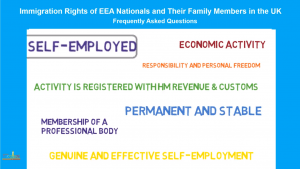Today’s post is about EU Citizens in the UK: QUALIFIED PERSONS, SELF-EMPLOYED PERSON
Why Should You Even Care?
If you are a self-employed EEA national, working and living in the UK why should you even care proving that you have probably established a self-employed business in the UK. After all, EEA nationals are not required to make any applications to the Home Office and can work live and work in the UK freely.
Well, my friends, the main reason for properly establishing your self-employed status in the UK because when you decide to apply for Permanent Right to Reside in the UK at some point in future. You will be required to do this anyway. The sooner you check that you comply with the necessary requirements the quicker you will adjust the route, if you are slightly off course at the moment. Let’s us check if you are on the right track right now.
Qualified Persons
‘Qualified Person’ is a magic legal term, which opens the doors to EEA nationals and their family members to remain in the UK after three months of unconditional initial residence in the UK. There are five categories of EEA nationals who may fall under the definition of a qualified person.
In my previous videos, I’ve covered jobseekers and workers, including those, who can retain their worker status despite the fact that they stopped working whether for reasons of pregnancy or health issues.
A self-employed person is an EEA national, exercising their free movement rights in the UK by working for themselves and generating an income in a self-employed capacity.

According to the Home Office Guidance, the decisions makers will consider your application on its own merits. However, there are a number of factors, which they are likely to take into consideration in every application when deciding if an EEA national has indeed established himself as a self-employed person in the UK.
These factors include, but not limited to:
- The EEA national’s economic activity
- responsibility and personal freedom
- if the UKVI can consider this activity as genuine and effective self-employment
- whether this activity is registered with HM Revenue & Customs (HMRC)
- whether it’s permanent and stable
- membership of a professional body
What documents you can be submit to strengthen the application?
Reasonable evidence of self-employment may include:
- a letter from HMRC confirming registration for tax and national insurance (NI) purposes as well as the EEA national’s letter confirming their self-employed status
- letter confirming payment of tax and NI contributions
- invoices for work done
- a copy of your business accounts
- your accountant’s letter
- leases on business premises (if this is applicable)
- advertisements for your business
- your business bank statements
How to Prove that Your Self-Employment is Genuine and Effective
There is no minimum amount of hours an EEA national must engage in self-employed activity to qualify as a self-employed person. All that you have to prove is that this self-employment is not marginal or supplementary.
What does ‘marginal or supplementary’ mean? It means that this activity takes very little time and brings very small amounts of money. For this reason the UKVI can consider it to be largely irrelevant to the EEA national’s lifestyle.
So, my advice here is to comply with the UK legislation. Especially when registering for tax and NI with HMRC and, of course, submitting our self-assessment forms on time every year.
